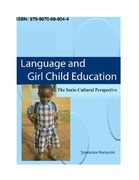| dc.contributor.author | Namusisi, Speranza | |
| dc.date.accessioned | 2017-01-24T12:01:45Z | |
| dc.date.available | 2017-01-24T12:01:45Z | |
| dc.date.issued | 2016 | |
| dc.identifier.citation | Namusisi, S. (2016). Language and Girl Child Education: The Socio-Cultural Perspective. Kampala: Uganda Martyrs University | en_US |
| dc.identifier.isbn | 978-9970-09-004-4 | |
| dc.identifier.uri | http://hdl.handle.net/20.500.12280/338 | |
| dc.description.abstract | This book focuses on the role language plays in the education of girls in Uganda’s primary education. It provides a historical and theoretical background to genders socialization education and language. It further discusses the theories and policies of Language and gender in education
The study brings to light the impact of language use on the girls’ life in school. It shows that the nature of language and how it is used can be a roadblock to girls’ attainment of education. This is because language has symbolic power which influences interaction. Evidence from the girls and other stakeholders show how girls have dropped out of school as a result of the way language issued at school and its surroundings.
The author recommends a supportive environment for girls’ education while paying special attention to the language policy in Uganda’s education system, a review of the study materials (especially those that are pictorial) used in children’s academic textbooks to portray gender balance, and training teachers in communication skills as a measure to retain girls in school. | en_US |
| dc.language.iso | en | en_US |
| dc.publisher | Uganda Martyrs University | en_US |
| dc.relation.ispartofseries | Uganda Martyrs University Book Series; | |
| dc.subject | Girl Child Education | en_US |
| dc.subject | Languages | en_US |
| dc.title | Language and Girl Child Education: | en_US |
| dc.title.alternative | The Socio-Cultural Perspective | en_US |
| dc.type | Book | en_US |


